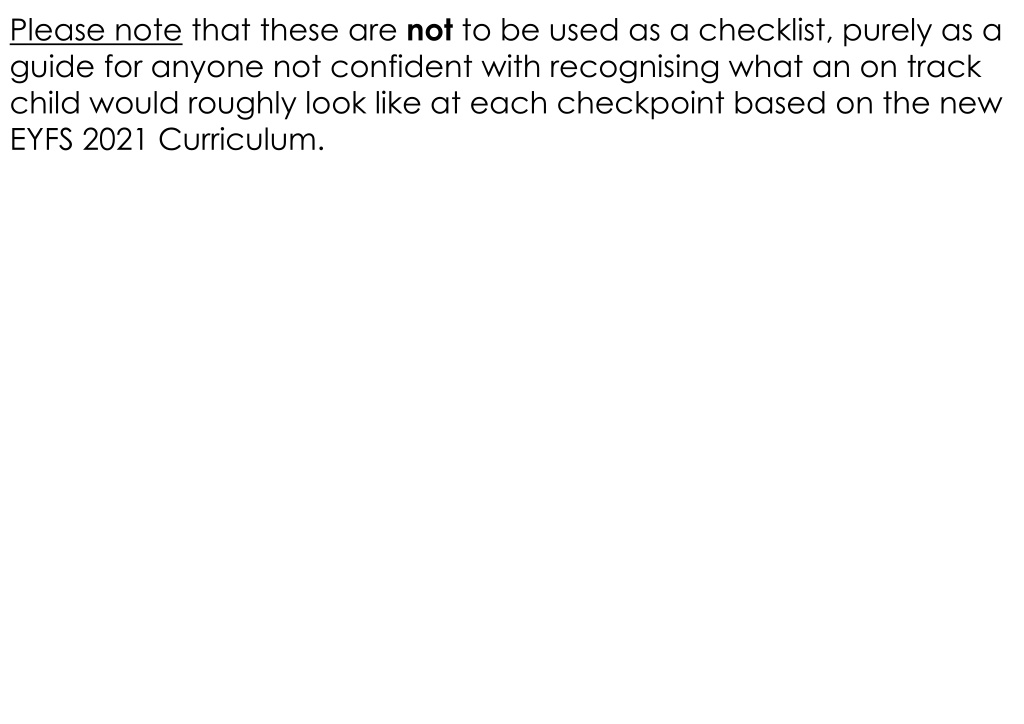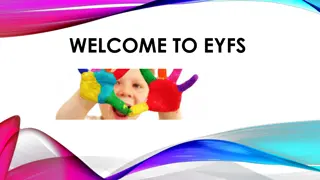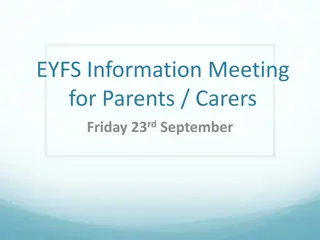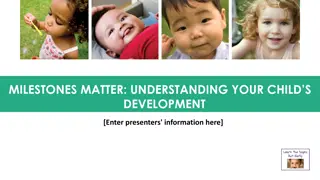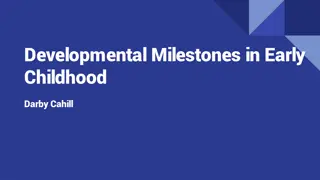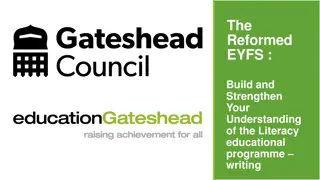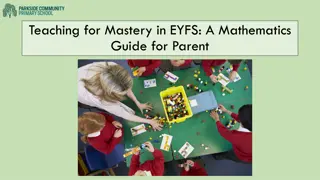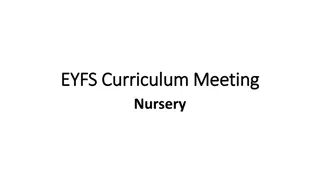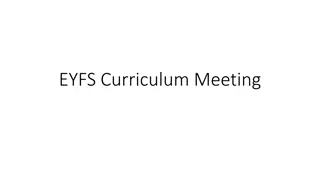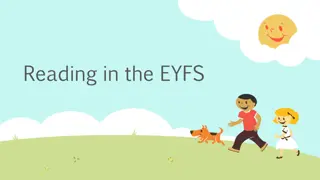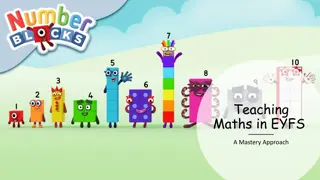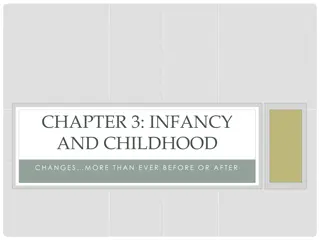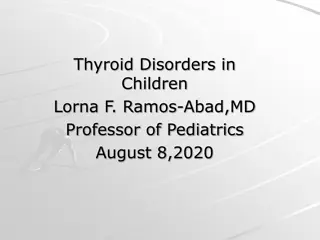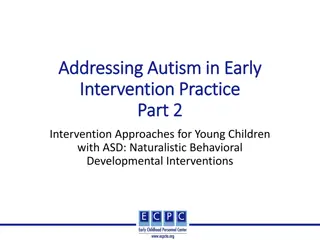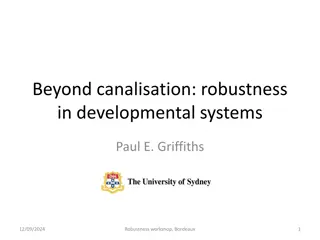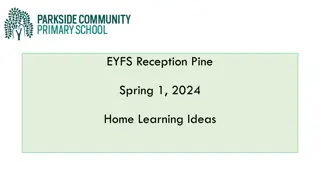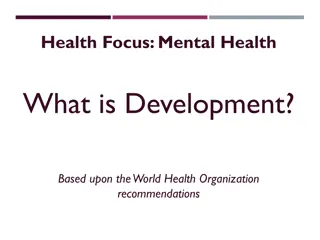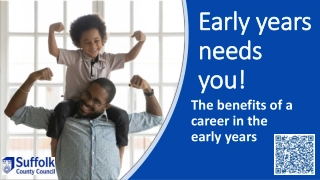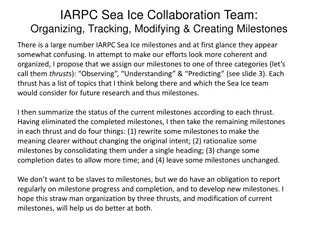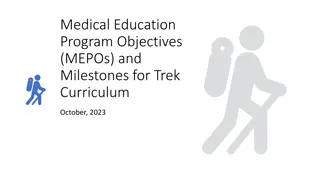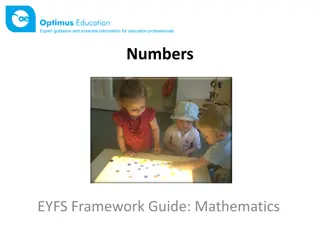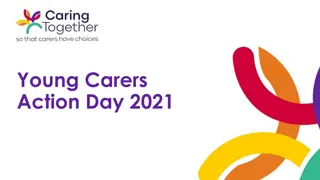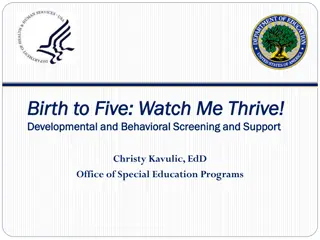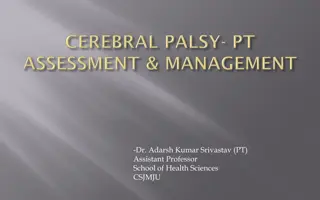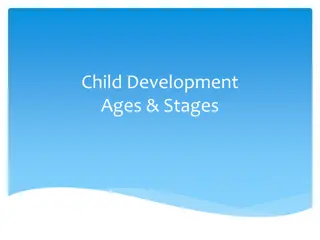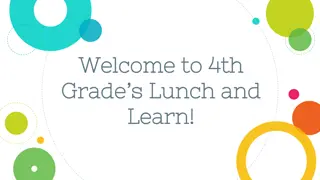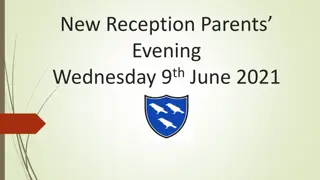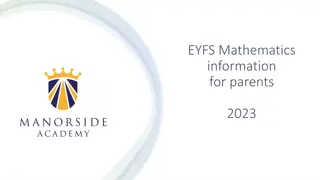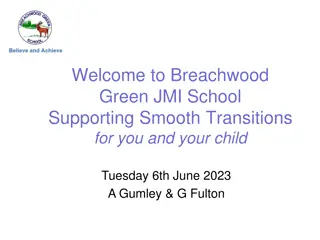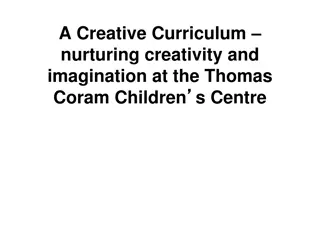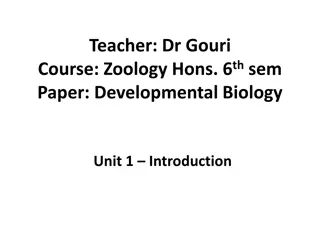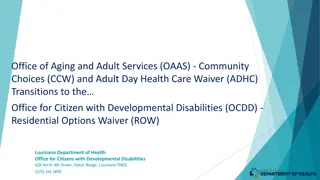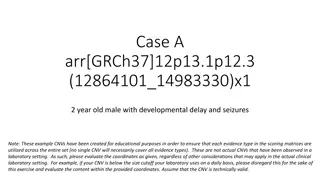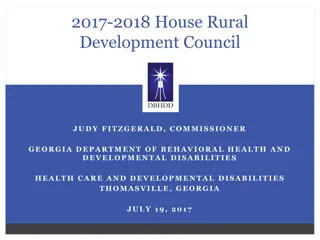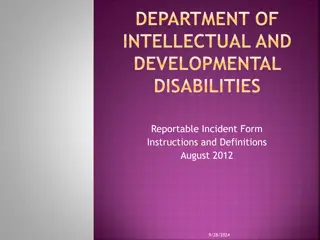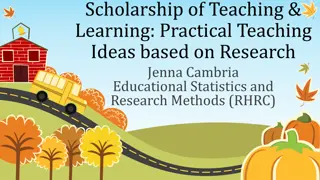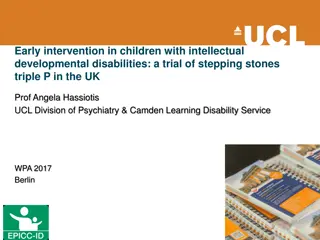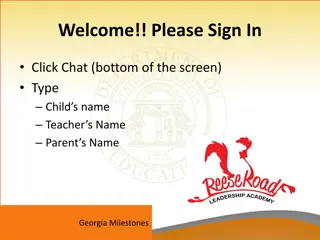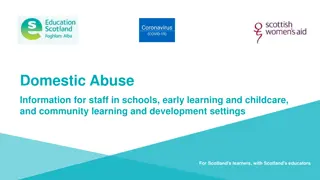Developmental Milestones for Young Children: EYFS 2021 Overview
Explore the key developmental milestones for young children at various checkpoints according to the EYFS 2021 Curriculum. From developing friendships and communication skills to cognitive and physical abilities, this guide provides a detailed overview of what children should roughly demonstrate at each stage - Baseline Checkpoint (age 2-3), Nursery Baseline, and Reception Baseline. The checkpoints cover a wide range of skills, from social interactions to language acquisition and physical development, offering insights into what constitutes a child on track in their development.
Download Presentation

Please find below an Image/Link to download the presentation.
The content on the website is provided AS IS for your information and personal use only. It may not be sold, licensed, or shared on other websites without obtaining consent from the author. Download presentation by click this link. If you encounter any issues during the download, it is possible that the publisher has removed the file from their server.
E N D
Presentation Transcript
Please note that these are not to be used as a checklist, purely as a guide for anyone not confident with recognising what an on track child would roughly look like at each checkpoint based on the new EYFS 2021 Curriculum.
Develop friendships with children. Notice and ask questions about others. Begin to show control over self. Manages transitions from home to nursery with support. Increasingly able to talk about and manage their Start to talk about own feelings. Developing conversation skills but may jump topics. Listen to simple stories and understand what is happening. Identify familiar objects and properties. Understand and act on longer sentences. Understand simple questions of who, what, where. Know a few songs and rhymes. emotions. Enjoy starting to kick, throw and catch balls. Build independently with a range of appropriate resources. Clap and stamp to music. Use large and small motor skills to do things independently, for example manage buttons and zips, and pour drinks. Learn to use the toilet with help then independence. Start to make marks intentionally. Explore paint, using body parts, brushes and other tools. Start to develop pretend play. Manipulate and play with different materials. Join in with songs and rhymes with sounds/actions. Explore instruments and play them in different ways. Nursery Baseline Enjoy sharing books with adults. Pay attention and respond to pictures or words, make comments and share own ideas. Notice some print, such as the first letter of their name, bus or door number, or familiar logo. Draw freely. Some marks made are given Make connections between the features of their family and other families. Notice differences between people. Explore and respond to different natural phenomena in their setting and on trips. Seeks to acquire basic skills in turning on and operating some digital equipment. Operates mechanical toys. Take part in finger rhymes with numbers. Compare amounts, saying lots, more or same. Count in everyday contexts, can skip numbers. Squeeze into different types of spaces. Build with a range of resources. Complete inset puzzles. Compare sizes, weights etc. using gesture/language - bigger/little/high/heavy. Notice and arrange patterns. meaning.
Be able to start and continue a conversation, express a point of view and debate with others. Use longer sentences of four to six words. Use a wider range of vocabulary. Develop communication and pronunciation but still with some errors. Talk in some detail about books read. Tell a long story. Talk with others to solve conflicts which arise. Be appropriately assertive. Independently follow rules. Use a wider range of vocabulary. Persevere with difficulties. Skip, hop, stand on one leg and hold a pose. Use a range of large-muscle movements. Begin to negotiate space. Start taking part in some group activities which they make up. Collaborate to manage large items. Recognise some safety considerations. Show a preference for a dominant hand. Make healthy choices about food, drink, activity and toothbrushing. Develop their own ideas and choose materials. Begin to develop complex stories in small world. Show different emotions in drawings/paintings. Explore colour and mixing. Remember and sing many songs and rhymes by heart. Sing the melodic shape of familiar songs. Create own songs, or improvise around one they know. Reception Baseline Extended conversations about stories, learning new vocab. Recognise words with the same initial sound. Recognise some sounds. Intentional mark making with ascribed meaning. Write strings of letters. Write initial sounds for some words. Write some of own name. Some letters are recognisable. Know there are different countries and talk about differences experienced or seen. Begin to make sense of their own life-story and family history. Value self as an individual. Talk about differences between materials and changes they notice. Understand the key features of some life cycles. Talk about what they see, using a wide vocabulary. Knows that info can be retrieved from digital devices and the internet. Plays with a range of materials to learn cause & effect. Link numerals and amounts. Solve real world maths problems with numbers up to 5. Describe a familiar route. Discuss routes and locations, using words like in front of and behind . Combine shapes to make new ones. Extend and create ABAB patterns and notice and correct an error. Begin to describe a sequence of events, real or fictional, using words such as first/then.
Nursery Autumn Checkpoints Communication and Language Personal, Social and Emotional Development Physical Development Reading Progression Express needs and wants. Listen to longer stories, recalling some main parts. Develop movement in terms of balancing, riding and ball skills. Use large-muscle movements to wave flags/streamers, paint and make marks. Match type of movement to activities. Understand the five key concepts about print: print has meaning, the names of the different parts of a book, print can have different purposes, page sequencing and we read English text from left to right and from top to bottom. Use accurate vocabulary when talking about their feelings. Understand two part questions and instructions. Manages transitions from home to nursery. Follows some rules. More confident in new situations. Select and use activities and resources. Increasingly independent with dressing/undressing. Begin to recognise danger, seeking support/comfort from significant adults. Talk about familiar books. Begin to use newly introduced vocabulary. Use one-handed tools and equipment. Develop their phonological awareness, so that they can: spot and suggest rhymes and count or clap syllables in a word. Start to eat independently, learning to use a knife & fork. Develops sense of membership and responsibility to the class. Developed relationships within the class. Writing Mathematics Understanding the World Expressive Art and Design Imitate writing with a variety of shapes and symbols. Distinguish between different marks made. Fast recognition of up to 3 objects, without counting (subitising). Say one number for each item in order to 5. Know the last number when counting tells you the total (cardinal principle). Continue to develop positive attitudes about the differences between people. Begin to make sense of their own life- story & family s history. Explore different materials freely, to develop ideas about how to use them & what to make. Create closed shapes with continuous lines & begin to use shapes to represent objects. Use drawing to represent ideas like movement or loud noises. Explore colour and colour- mixing. Use senses in exploration of natural materials. Explore materials with similar/different properties. Talk about what they see, using a wide vocabulary. Explore how things work. Begin to understand the need to respect/care for the natural environment & living things. Compare quantities using language: more, fewer. Explore 2D/3D shapes using language: sides, corners, straight, flat. Select shapes appropriately: a triangular for a roof etc. Take part in simple pretend play. Listen with increased attention to sounds. Shows an interest in technological toys, real objects and touchscreen devices. Skilled in making toys work.
Reception Autumn Checkpoints Communication and Language Personal, Social and Emotional Development Physical Development Reading Progression Understand how to listen carefully and why listening is important. Learn new vocabulary and use it in context. Begin to ask questions to find out more and clarify understanding. Engage in storytimes through attentive listening and discussion to build familiarity and understanding. Refine the fundamental movement skills already acquired. Progress towards a more fluent style of moving. Develop overall body- strength, balance, coordination and agility. Re-read books to build up their confidence in word reading, their fluency and their understanding and enjoyment. See themself as a valuable individual. Build constructive and respectful relationships. Read words which include set 1 single sounds. Read VC + CVC words. Blend sounds into words. Identify and moderate their own feelings socially and emotionally and consider the feelings of others. Develop small motor skills to use of tools competently, safely & confidently. Show resilience and perseverance in the face of challenge. Manage their own needs. Know and talk about the different factors that support their overall health and wellbeing. *All very interlinked Develop the skills needed to manage the school day successfully. Writing Mathematics Understanding the World Expressive Art and Design Write own name confidently. Write words which include set 1 single sounds. Write VC + CVC words. Some letters are correctly formed and most others are recognisable. Count objects/actions/sounds. Subitise. Link numerals with its cardinal value. Count beyond 10. Explore the composition of numbers to 10. Draw information from a simple map. Explore, use and refine a variety of artistic effects to express their ideas and feelings. Understand that some places are special to members of their community. Explore the natural world around them. Talk about members of their immediate family & community. Name & describe people who are familiar to them. Listen attentively, move to and talk about music, expressing their feelings and responses. Develop storylines in their pretend play. Compare numbers/quantities. Understand the one more/one less relationship between numbers. Select & manipulate shapes to develop spatial reasoning skills. Compose & decompose shapes (recognise shapes have other shapes within). Continue & create repeating patterns. Compare length, weight & capacity. Complete a simple program on electronic devices. Use ICT hardware to interact with age appropriate computer software.
Self Regulation Begin to understand how others might be feeling. Managing Self Increasingly follows rules showing understanding to why they are important. Listening, Attention and Understanding Begin to pay attention to more than one thing at a time. Understand why questions. Enjoy listening to stories and remember most key points. Speaking Begin to organise play through talk. Know several songs and rhymes. Building Relationships Help find solutions to conflicts with others. Extend and elaborate play ideas when engaging with others. More outgoing with unfamiliar people. Fine Motor Choose the right resources and tools to carry out their own plan. Use a comfortable grip with good control when holding pens and pencils. Gross Motor Creating with Materials Join different materials & explore different textures. Make imaginative and complex small worlds with blocks & construction kits. Draw with increasing complexity & detail, such as representing a face with a circle and including details. Explore colour and colour-mixing. Being Imaginative and Expressive Begin to tell simple stories in pretend play. Remember and sing entire songs/rhymes. Go up steps and stairs, or climb up apparatus. Increasingly able to use and remember sequences and patterns of movements which are related to music or rhythm. Nursery Spring Personal Care* Increasingly independent in meeting their own care needs. Comprehension Engage in conversations about stories, learning new vocabulary. Word Reading Understand the five key concepts about print: print has meaning, the names of the different parts of a book, print can have different purposes, page sequencing and we read English text from left to right and from top to bottom. Develop phonological awareness to spot and suggest rhymes and count or clap syllables in a word. Numbers Fast recognition of up to 3 objects, without counting (subitising). Say one number for each item in order to 5. Know the last number when counting tells you the total (cardinal principle). Past and Present Begin to make sense of their own life- story & family s history. People, Cultures and Communities Continue to develop positive attitudes about the differences between people. The Natural World Explore materials with similar/different properties. Explore different forces they can feel. Plant seeds and care for growing plants. Talk about what they see, using a wide vocabulary. Writing Write letter like forms. Use mark making in play. Write first letter of own name. Shape, Space and Measure* Understand position through words alone. Make comparisons between objects relating to length, weight and height. Combine shapes to make new ones. Technology* Knows how to operate simple equipment.
Self Regulation Identify and moderate their own feelings socially and emotionally and consider the feelings of others. Managing Self Listening, Attention and Understanding Developing listening skills which enable them to listen carefully to others and with attention. Speaking Engage in conversations exploring non-fiction topics, developing knowledge and vocabulary. Use talk to help work out problems and organise thinking and actions. Articulate their ideas and thoughts in well-formed sentences. Retell stories in own words, drawing on key phrases from the text. Show resilience and perseverance in the face of challenge. Manage their own needs. Know and talk about the different factors that support their overall health and wellbeing. Building Relationships See self as a valuable individual. Build constructive and respectful relationships. Fine Motor Develop more control over the use of small tools. Gross Motor Creating with Materials Begin to construct with a plan in mind. Return to and build on their previous learning, refining ideas and developing their ability to represent them. Being Imaginative and Expressive Develop a storyline in their pretend play. Sing in a group or on their own, increasingly matching the pitch and following the melody. Engage in music making. Develop overall body-strength, balance, coordination and agility needed to engage successfully with future physical education sessions and other physical disciplines. Use a range of large and small apparatus. Develop confidence, competence, precision and accuracy when engaging in ball activities. Reception Spring Comprehension Engage in and re-read fiction and non-fiction books to build up their understanding and enjoyment. Word Reading Past and Present Comment on images of familiar situations in the past. Compare & contrast characters from stories & figures from the past. People, Cultures and Communities Draw information from a simple map. Understand that some places are special to members of their community. Recognise that people have different beliefs & celebrate special times in different ways. Recognise some similarities & differences between life in this country and life in other countries. The Natural World Describe what they see, hear & feel whilst outside. Re-read books to build up confidence in word reading and fluency. Read words which include set 1 single sounds and digraphs, CVCC + CCVC words, simple phrases and sentences, blending sounds into words. Read a few set 1 tricky words. Numbers Count objects, actions & sounds. Subitise. Link numerals with its cardinal value. Count beyond 15. Explore the composition of numbers to 10. Automatically recall number bonds for numbers 0 5. Writing Write words with all set 1 sounds (CVCC + CCVC) and captions. Words are phonetically plausible. Write a few set 1 tricky words. Most letters are correctly formed and others are recognisable. Number Patterns Compare numbers. Understand the one more/one less relationship between numbers. Technology* Create content such as a video recording, stories or draw a picture on screen. Shape, Space and Measure* Compose and decompose shapes (recognise shapes have other shapes within it). Continue and create repeating patterns. Compare length, weight and capacity.
Self Regulation Use accurate vocabulary when talking about their feelings. Begin to understand Listening, Attention and Understanding Mostly able to pay attention for a fair amount of time. Understand a range of questions. Begin to attentively listen to stories. Speaking Be able to start and continue a conversation, express a point of view and debate with others. Use longer sentences of four to six words. Use a wider range of vocabulary. Develop communication and pronunciation but still with some errors. Know several songs and rhymes. Talk in some detail about books read. Tell a long story. how others might be feeling. Managing Self Independently follow rules. Persevere with difficulties. Building Relationships Talk with others to solve conflicts which arise. Be appropriately assertive. Use a wider range of vocabulary. Fine Motor Show a preference for a dominant hand. Use a comfortable grip with good control when holding pens and pencils. Gross Motor Creating with Materials Develop their own ideas and choose materials. Show different emotions in drawings/paintings. Explore colour and mixing. Being Imaginative and Expressive Begin to develop complex stories in small world. Remember and sing many songs and rhymes by heart. Sing the melodic shape of familiar songs. Create own songs, or improvise around one they know. Skip, hop, stand on one leg and hold a pose. Use a range of large-muscle movements. Begin to negotiate space. Start taking part in some group activities which they make up. Collaborate to manage large items. Recognise some safety considerations. Personal Care* Nursery Summer Independent in meeting their own care needs. Make healthy choices about food, drink, activity and toothbrushing. Comprehension Engage in extended conversations about stories, learning new vocabulary. Word Reading Past and Present Begin to make sense of own life-story and family history. People, Cultures and Communities Value self as an individual. Know there are different countries and talk about differences experienced or seen. The Natural World Talk about differences between materials and changes they notice. Understand the key features of some life cycles. Talk about what they see, using a wide vocabulary. Numbers Recite numbers past 5. Show finger numbers up to 5. Experiment with own symbols, marks & numerals. Link numerals and amounts. Solve real world maths problems with numbers up to 5. Develop their phonological awareness, so that they can: spot and suggest rhymes and count or clap syllables in a word and recognise words with the same initial sound. Writing Intentional mark making with ascribed meaning. Write strings of letters. Write initial sounds for some words. Write/match some of own name. Some letters are recognisable. Shape, Space and Measure* Describe a familiar route. Discuss routes and locations, using words like in front of and behind . Explore 2D/3D shapes using language: sides, corners, straight, flat. Technology* Knows that info can be retrieved from digital devices and the internet. Plays with a range of materials to learn cause and effect.
Self Regulation Identify and moderate their own feelings socially and emotionally and consider the feelings of others. Set and work towards simple goals. Control their immediate impulses when appropriate. Give focused attention to what the teacher says. Listening, Attention and Understanding Understand how to listen carefully to others with attention. Confidently ask questions to find out more and extend understanding. Hold conversation when engaged in back-and-forth exchanges with their teacher and peers. Speaking Present to a group using well articulated sentences and detailed descriptions. Express their ideas and feelings about their experiences using full sentences, including use of past, present and future tenses. Join ideas together using connectives. Use rich vocabulary in different contexts. Managing Self Show resilience and perseverance in times of challenge. Manage their own needs. Know and talk about factors that support their overall health/wellbeing. Building Relationships Build constructive, respectful relationships. Show sensitivity to others. Take turns. Fine Motor Develop the foundations of a handwriting style which is fast, accurate and efficient. Use a range of small tools, including scissors, paint brushes and cutlery. Creating with Materials Create collaboratively, sharing ideas, resources & skills. Construct with a plan in mind, reflecting on the outcome and making alterations/improvements. Explore, use and refine a variety of artistic effects to express their ideas and feelings. Being Imaginative and Expressive Talk about dance and performance art, expressing their feelings and responses. Explore and engage in music making and dance, performing solo or in groups. Gross Motor Further develop and refine a range of ball skills. Use core muscle strength to achieve a good posture when sitting at a table or sitting on the floor. Combine different movements with ease and fluency. Confidently and safely use a range of large and small apparatus. Reception Summer Comprehension Re-read books to build up their confidence in word reading, their fluency and their understanding and enjoyment. Past and Present Comment on familiar situations in the past. Compare & contrast characters from stories & figures from the past. People, Cultures and Communities Draw information from a simple map. Understand that some places are special to members of their community. Recognise that people have different beliefs & celebrate special times in different ways. Recognise some similarities & differences between life in this country and others and between environments. The Natural World Explore the natural world around them, making observations and drawing animals & plants. Understand effects of changing seasons on the natural world. Technology* Develop digital literacy skills to interact with technology. Use the internet to retrieve info. Word Reading Read words which include set 1+2 sounds. Read longer words. Read simple phrases and sentences. Read some set 1+2 tricky words. Numbers Count objects, actions & sounds. Subitise. Link numerals with its cardinal value. Count beyond 20. Explore the composition of numbers to 10. Automatically recall number bonds for numbers 0 10. Writing Write words which include set 1+2 sounds. Write longer words. Words are phonetically plausible. Write some set 1+2 tricky words. Write sentences which can be read back and by others. Begin to use capital letter and full stop. Read sentence back to check for accuracy and sense. All letters are correctly formed. Number Patterns Compare numbers. Understand the one more/one less relationship between numbers. Shape, Space and Measure* Compose and decompose shapes (recognise shapes have other shapes within it). Continue and create repeating patterns. Compare length, weight and capacity.
